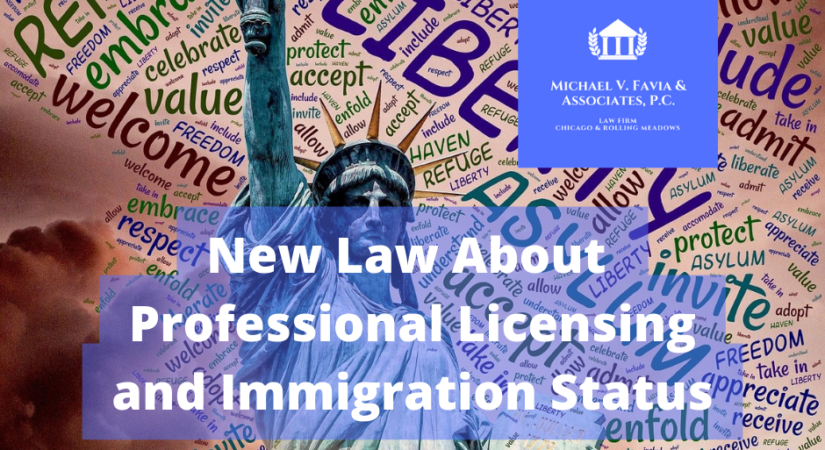New Law About Professional Licensing and Immigration Status
In a significant development, Illinois has passed a new law that allows undocumented immigrants to retain their professional licenses even if they face deportation. This groundbreaking legislation, House Bill 5457, was signed into law by Gov. J.B. Pritzker and has sparked many reactions. As we delve into the intricacies of this law, we’ll explore its provisions, impact, and the role of lawyers like Michael V. Favia & Associates, P.C., in navigating these new legal waters involving Illinois professional licenses for immigrants despite deportation.
In Illinois, immigrants holding professional licenses span a diverse range of professions. For instance, doctors and nurses from various countries have received medical training abroad and now practice in hospitals and clinics across the State of Illinois and beyond our borders, many under the Nurse Licensure Compact, of which Illinois is a participating member state. Additionally, many immigrants are licensed engineers contributing to infrastructure projects, ensuring the safety and efficiency of roads and bridges. The legal field also sees many immigrant attorneys who provide valuable services in immigration law, corporate law, and civil rights advocacy. Furthermore, licensed clinical social workers and counselors from immigrant backgrounds play a crucial role in mental health services, offering support to diverse communities. These examples illustrate the broad spectrum of skilled professionals contributing to Illinois’ economy and society despite facing immigration challenges.
Learn About Chicago IDFPR Defense at the Favia Law Firm
Background of the Law
House Bill 5457 was introduced to prevent the automatic revocation of professional licenses due to immigration violations. This measure was championed by state Rep. Barbara Hernandez, who emphasized ensuring that professionals can continue their work without fearing losing their licenses due to federal immigration delays. State Rep. Dan Ugaste highlighted the complexities this law introduces, particularly in holding professionals accountable if they are no longer in the country.
Key Provisions of the Law
The new law stipulates that the Illinois Department of Financial and Professional Regulation (IDFPR) cannot revoke, suspend, or take disciplinary action against a professional license based solely on an individual’s immigration status. Additionally, the law mandates that all professional examinations must provide reasonable accommodations for non-English speakers, ensuring a fair opportunity for all applicants.
Impact on Professionals
This law primarily benefits immigrants with professional licenses in healthcare, social work, and counseling. For instance, a licensed clinical social worker who faces deportation can retain their license and continue to practice if they return to the U.S. or provide remote services. This provision helps mitigate the risk of unemployment and professional disruption caused by immigration status issues.
Legal Implications
The IDFPR is now responsible for ensuring that licensed professionals are not unfairly penalized for immigration violations. However, this raises concerns about monitoring and accountability, particularly if a professional practices outside the U.S. The challenge lies in ensuring that these professionals maintain the same standards of practice and ethics expected within the state.
Support and Opposition
Supporters of the law argue that it provides essential protection for immigrant professionals, allowing them to continue contributing to their fields without fearing losing their livelihood. Critics, however, point out the potential malpractice risks due to the challenges of monitoring professionals outside the U.S. and the difficulties in enforcing standards across borders. To
address these concerns, the law requires professionals to adhere to Illinois’ standards of practice and ethics, regardless of their location. This debate underscores the complexity of balancing professional integrity with immigrant rights.
Comparison with Other States
Illinois is not alone in this approach; other states have implemented similar laws to protect immigrant professionals. However, Illinois stands out by offering specific accommodations for non-English speakers during professional examinations, demonstrating a profound commitment to inclusivity and fairness that makes all professionals feel respected and included.
Role of Michael V. Favia & Associates, P.C.
Michael V. Favia & Associates, P.C., a renowned law firm in Chicago, plays a crucial role in assisting professionals affected by this new law. With extensive expertise in general practice law, the firm provides guidance on maintaining licensure, navigating legal complexities, and ensuring compliance with state regulations, particularly in immigration-related challenges. Their support is invaluable for professionals facing the uncertainties of immigration-related challenges.
Future Outlook
The law goes into effect on January 1, 2025, and its long-term impact remains to be seen. Potential amendments and adjustments may arise as stakeholders address practical challenges, such as monitoring professionals practicing outside the U.S. and enforcing Illinois’ standards of practice and ethics. It’s important for all professionals to stay informed and prepared for these changes. Nonetheless, the law represents a significant step towards protecting the rights of immigrant professionals and ensuring their continued contribution to Illinois’ professional landscape.
Contact Michael V. Favia & Associates, P.C. for More Information and Consultation
House Bill 5457 marks a pivotal moment in Illinois’ legislative history, offering vital protections for immigrant professionals. While the law presents challenges in enforcement and accountability, its benefits in safeguarding professional licenses are undeniable. As licensing lawyers like Michael V. Favia & Associates, P.C. navigate these new regulations, the future looks promising for immigrant professionals striving to maintain their careers despite immigration uncertainties, providing reassurance and confidence about their professional future.

